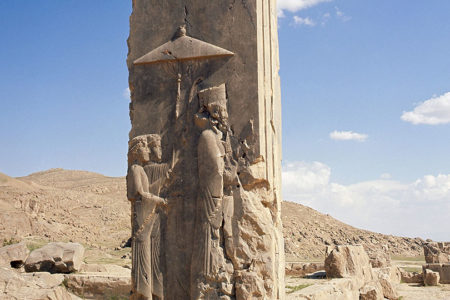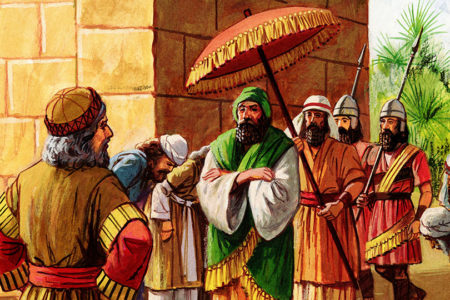How the Megillah Ends Esther 6—10
Criminals are a superstitious, cowardly lot.” So says one of America’s popular comic-book superheroes. He could have added, “And they’re a proud lot, too.” Most villains are proud and arrogant to a fault. Such was the case with Haman, the villain in the book of Esther.
A bureaucrat in the court of Persian King Ahasuerus in the fifth century B.C., Haman not only enjoyed Ahasuerus’s trust, but he also enjoyed wealth, power, and authority (Est. 5:11). Was he satisfied? No. He was miserable because a lone Jewish man named Mordecai refused to bow before him. Despite all he had, he was convinced he could not fully enjoy his position until Mordecai and, ultimately, Mordecai’s entire race were obliterated.
Haman is the earthly foe who troubled the Jewish people in the Persian Empire. However, their ultimate foe—the power behind Haman— was the same as it is today: Satan. Before his rebellion against God, Satan was known as Lucifer, “the anointed cherub who covers” (Ezek. 28:14). At some point after his creation, Lucifer declared, “I will be like the Most High [God]” (Isa. 14:14). His prideful self-exaltation and desire to be worshiped motivated his corruption of humanity in the Garden of Eden and the spiritual conflict of the ages between him and the God of the universe.
Bible scholar Dr. Charles Ryrie suggested Mordecai refused to bow to Haman “because Haman claimed some sort of divine honors, as did the Persian kings.”1 This lack of worship so irritated Haman that he hated Mordecai and every Jewish person in the world. So he hatched a plot to annihilate them. He deceived the king into passing a law to have every Jewish person in the kingdom killed, and he had a 75-foot-high gallows constructed in his backyard on which he planned “that Mordecai be hanged” (Est. 5:14). The gallows was as tall as a modern five-story building. Haman no doubt wanted everyone in the city to see Mordecai hang.
God’s Intervention
A sleepless night led King Ahasuerus to do what many do when they cannot sleep: read. He read “the book of the records of the chronicles,” which recorded how Mordecai had alerted the authorities to a plot to kill the king (6:1–3).
“What honor or dignity has been bestowed on Mordecai for this [service]?” Ahasuerus asked (v. 3). “Who is in the court?” (v. 4).
Haman had just entered the outer court to suggest the king hang Mordecai (v. 4). But God had another plan. When the king asked Haman, “What shall be done for the man whom the king delights to honor?” (v. 6), Haman thought, “Whom would the king delight to honor more than me?” (v. 6). So, from a prideful heart that craved preeminence, Haman concocted an elaborate plan to elevate himself almost to the level of the king:
Let a royal robe be brought which the king has worn, and a horse on which the king has ridden, which has a royal crest placed on its head. Then let this robe and horse be delivered to the hand of one of the king’s most noble princes, that he may array the man whom the king delights to honor. Then parade him on horseback through the city square, and proclaim before him: “Thus shall it be done to the man whom the king delights to honor!” (vv. 8–9).
Imagine his surprise when the king told him, “Hurry, take the robe and the horse, as you have suggested and do so for Mordecai the Jew” (v. 10). Oh the humiliation Haman must have felt as he did as he was commanded.
Ultimately, Esther revealed Haman’s plot to Ahasuerus. The king became enraged. Haman, suddenly terrified, pleaded for his life. “Now Harbonah, one of the eunuchs, said to the king, ‘Look! The gallows, fifty cubits high, which Haman made for Mordecai, who spoke good on the king’s behalf, is standing at the house of Haman.’ Then the king said, ‘Hang him on it!’” (7:9). So Haman was hung on the gallows he had built for Mordecai.
The King’s Second Decree
Esther begged the king to revoke Haman’s letters calling for the Persians to massacre the Jewish people throughout the empire. However, the empire’s laws prevented Ahasuerus from doing so. But he gave Mordecai and Esther authority to write another decree, giving the Jewish people the right to defend themselves (8:11–14).
And all the officials of the provinces…helped the Jews, because the fear of Mordecai fell upon them. For Mordecai was great in the king’s palace, and his fame spread throughout all the provinces; for this man Mordecai became increasingly prominent. Thus the Jews defeated all their enemies with the stroke of the sword, with slaughter and destruction, and did what they pleased with those who hated them (9:3–5).
Haman’s 10 sons were hanged, and Mordecai and Esther established the holiday of Purim (vv. 26–32). Purim is a joyous festival because the story has a happy ending. The Jewish people prevailed, Mordecai became great, and all turned out well.
Today the Jewish people are again threatened by a Persian. Mahmoud Ahmadinejad, the president of Iran, formerly Persia, wants nuclear weapons so he can destroy Israel. His goal is much like his ancient predecessor’s. Times change, names change, but Satan’s goal remains the same: to destroy Israel. And his eternal abode will be the same as Haman’s (Rev. 20:10–15).
The Lord has promised that His beloved Israel will never be destroyed. Its security is forever settled in the heavens:
Thus says the LORD, who gives the sun for a light by day, the ordinances of the moon and the stars for a light by night, who disturbs the sea, and its waves roar (The LORD of hosts is His name): “If those ordinances depart from before Me, says the LORD, then the seed of Israel shall also cease from being a nation before Me forever.” Thus says the LORD: “If heaven above can be measured, and the foundations of the earth searched out beneath, I will also cast off all the seed of Israel for all that they have done, says the LORD” (Jer. 31:35–37).
He has told Israel, “I have loved you with an everlasting love” (Jer. 31:3); and He is the same yesterday, today, and forever (Heb. 13:8).
ENDNOTES
- Charles C. Ryrie, The Ryrie Study Bible NKJV (Chicago, IL: Moody Press, 1985), 748 n Esther 3:2.







